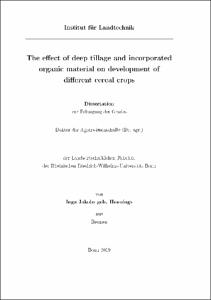Jakobs, Inga: The effect of deep tillage and incorporated organic material on development of different cereal crops. - Bonn, 2019. - Dissertation, Rheinische Friedrich-Wilhelms-Universität Bonn.
Online-Ausgabe in bonndoc: https://nbn-resolving.org/urn:nbn:de:hbz:5n-56553
Online-Ausgabe in bonndoc: https://nbn-resolving.org/urn:nbn:de:hbz:5n-56553
@phdthesis{handle:20.500.11811/8021,
urn: https://nbn-resolving.org/urn:nbn:de:hbz:5n-56553,
author = {{Inga Jakobs}},
title = {The effect of deep tillage and incorporated organic material on development of different cereal crops},
school = {Rheinische Friedrich-Wilhelms-Universität Bonn},
year = 2019,
month = nov,
note = {Climate change is the most challenging factor for modern agriculture. The risk of heatwaves combined with heavy precipitation events and steady rainfall absence determines agriculture in many regions of the world. One of the key factors to mitigate these problems is a optimum soil performance. By this adapted tillage to improve soil performance and thus, mitigate impacts of climate change is of outstanding importance. The subsoil (soil layer beneath the A-horizon) is a soil layer very rich in nutrients and carbon, and contains water reservoirs which are important during times of drought. However, this soil layer is very often compacted and soil physical properties do not allow plant roots to develop into it. Deep soil loosening (subsoiling) can be highly beneficial to soil physical properties and improve soil structure substantially. Beneath, sustainable fertilizer application is also of outstanding importance. The combination of subsoiling and deep placed organic fertilizer can be a solution to improve soil performance and secure stable cereal crop yield at times of climate change. The objective of this thesis is to test how deep soil loosening, and its combination with deep placed organic fertilizer affects cereal crop development. Subsoiling is undertaken stripwise and yields are monitored in two distances to the melioration. Results show that different working tools affect plant development and organic fertilizers being rich in nitrogen (biocompost) and with a dense C:N ratio are highly valuable to yield development compared to untreated control. Organic fertilizers with wider C:N ratios do not increase yield in the short-term (year 1) while for one material (chopped straw) a trend towards positive effects is recognizable on the longer term (year 2). Results at fallow land demonstrate that yields continuously decrease with distance to the melioration and an optimum strip distance of 1 m creates beneffcial effects for a whole crop area. The combined results of pre-trial and main-trial allow the conclusion that mixing of biocompost and chopped straw can substantially increase cereal crop yields at times of climate change, respectively to weather and soil conditions in the area of 'Rhineland Bonn'.},
url = {https://hdl.handle.net/20.500.11811/8021}
}
urn: https://nbn-resolving.org/urn:nbn:de:hbz:5n-56553,
author = {{Inga Jakobs}},
title = {The effect of deep tillage and incorporated organic material on development of different cereal crops},
school = {Rheinische Friedrich-Wilhelms-Universität Bonn},
year = 2019,
month = nov,
note = {Climate change is the most challenging factor for modern agriculture. The risk of heatwaves combined with heavy precipitation events and steady rainfall absence determines agriculture in many regions of the world. One of the key factors to mitigate these problems is a optimum soil performance. By this adapted tillage to improve soil performance and thus, mitigate impacts of climate change is of outstanding importance. The subsoil (soil layer beneath the A-horizon) is a soil layer very rich in nutrients and carbon, and contains water reservoirs which are important during times of drought. However, this soil layer is very often compacted and soil physical properties do not allow plant roots to develop into it. Deep soil loosening (subsoiling) can be highly beneficial to soil physical properties and improve soil structure substantially. Beneath, sustainable fertilizer application is also of outstanding importance. The combination of subsoiling and deep placed organic fertilizer can be a solution to improve soil performance and secure stable cereal crop yield at times of climate change. The objective of this thesis is to test how deep soil loosening, and its combination with deep placed organic fertilizer affects cereal crop development. Subsoiling is undertaken stripwise and yields are monitored in two distances to the melioration. Results show that different working tools affect plant development and organic fertilizers being rich in nitrogen (biocompost) and with a dense C:N ratio are highly valuable to yield development compared to untreated control. Organic fertilizers with wider C:N ratios do not increase yield in the short-term (year 1) while for one material (chopped straw) a trend towards positive effects is recognizable on the longer term (year 2). Results at fallow land demonstrate that yields continuously decrease with distance to the melioration and an optimum strip distance of 1 m creates beneffcial effects for a whole crop area. The combined results of pre-trial and main-trial allow the conclusion that mixing of biocompost and chopped straw can substantially increase cereal crop yields at times of climate change, respectively to weather and soil conditions in the area of 'Rhineland Bonn'.},
url = {https://hdl.handle.net/20.500.11811/8021}
}






